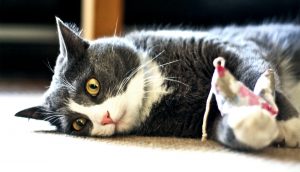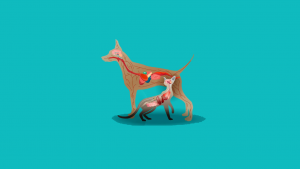Have you ever noticed your usually playful cat suddenly becoming withdrawn, hiding under the bed instead of chasing their favorite toy? What if there was a natural way to help them rediscover their joy? This is where CBD for cats comes in.
Think of the ECS as a vast network of receptors located throughout your cat’s body. These receptors receive signals and help maintain balance, influencing essential functions like sleep, digestion, immunity, and stress response. When CBD enters the body, it interacts with these receptors, potentially helping to restore balance and promote overall well-being.
Safety is a vital concern for any pet owner considering CBD. Generally, CBD is considered safe for cats when used correctly, meaning with pet-specific products and adherence to recommended dosage guidelines. While some cats might experience mild side effects like drowsiness, changes in appetite, or mild stomach upset, it’s crucial to consult your veterinarian before giving your cat CBD, especially if they are currently taking other medications.
Does your cat become anxious during car rides, or do thunderstorms send them scrambling for cover? CBD may offer relief by utilizing its calming properties to reduce anxiety and ease stress, allowing you to envision your once-anxious kitty finally relaxed and purring contentedly, even during a vet visit.
Inflammation is often at the root of many health issues in cats, from arthritis to inflammatory bowel disease. CBD can help reduce inflammation, ultimately easing discomfort and improving your cat’s overall quality of life.
As cats age, they often experience chronic pain stemming from conditions like arthritis. CBD may help manage this pain by interacting with pain receptors within the ECS, leading to more comfortable days and more playful moments for your feline companion.
Arthritis is a common ailment in senior cats, causing joint pain and stiffness. CBD’s anti-inflammatory and pain-relieving properties can help alleviate these symptoms, allowing your cat to move more freely and experience greater comfort.
While ongoing research continues, some studies suggest that CBD may help reduce both the frequency and severity of seizures, offering a potentially valuable option for cats diagnosed with epilepsy.
If your cat is a picky eater or has experienced a loss of appetite due to illness, CBD can help stimulate their appetite and encourage healthier eating habits.
Beyond addressing specific ailments, CBD can also contribute to a cat’s overall wellness by helping regulate the ECS and promoting balance throughout the body.
CBD for cats is available in various forms, including oils, treats, and capsules. Oils often provide the most precise dosing, while treats offer a convenient administration method, especially for picky eaters.
It’s generally recommended to start with a low dose of CBD and gradually increase it as needed, always carefully following the manufacturer’s instructions and consulting with your veterinarian for personalized guidance.
When choosing a CBD oil for your cat, look for products made with organic hemp, that have undergone third-party lab testing for purity and potency, and are specifically formulated for pets, while ensuring they contain no THC.
The most effective method is usually to use a dropper to place the oil directly under their tongue; however, if your cat resists this, you can try mixing it with a small amount of their favorite food.
Mixing the CBD oil into wet food can be a good way to disguise the taste and ensure your cat consumes the full dose.
While CBD is generally well-tolerated by cats, some may experience mild side effects, such as drowsiness, changes in appetite, or occasional diarrhea.
After administering CBD to your cat, it’s important to monitor them closely for any adverse reactions, and if you observe anything concerning, discontinue use and contact your veterinarian.
Because CBD has the potential to interact with certain medications, it’s crucial to have a conversation with your veterinarian before administering CBD to your cat, especially if they are currently taking other medications.

What Is CBD for Cats? CBD (Cannabidiol) is a natural compound from hemp. It’s non-psychoactive, meaning your cat won’t get “high.” Instead, it works with...
Read More
Potential Health Benefits of CBD for Dogs and Cats Pain and Inflammation Relief CBD may alleviate pain and inflammation in pets with arthritis or joint...
Read More
CBD Dog Benefits: Calming the Canine Chaos – How CBD Eases Dog Anxiety Does your dog turn into a mess during thunderstorms? Does he bark...
Read More
Medicinal Treatment The first way to treat cat anxiety is with medication. Depending on how bad the anxiety is, the vet may prescribe medication similar...
Read More
What Is The Endocannabinoid System in Pets? The endocannabinoid system in humans has gotten increasing attention in recent years, particularly as the internal system has...
Read More
How Do You Determine The Proper Dosage of CBD Oil For Your Cat? As there’s little evidence beyond the anecdotal kind for CBD’s safety and...
Read More
While the need for more research is always needed, it’s generally assumed that CBD is safe for humans and dogs. For both humans and canines,...
Read More
CBD may be able to help your pet with a diverse range of ailments. Discover which diseases and conditions may be alleviated by this substance.
Read More
CBD can help pets deal with anxiety and other issues if you get the dosage right. Learn how to calculate a proper dose and how...
Read More
As cannabis has gained more public attention and increasingly been legalized, people are increasingly thinking about CBD for pets. At first glance, this idea may...
Read More